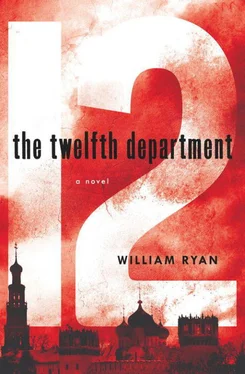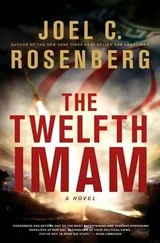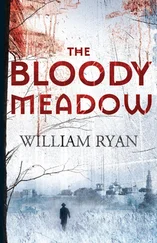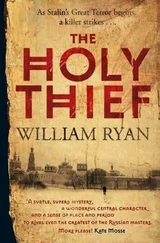Her voice rose as she spoke and by the time she’d finished it wasn’t far off the level at which you might address a small crowd—but it seemed she was trying to persuade herself as much as him. Korolev was past persuasion—he was too close to the Revolution as it was, and reluctant to get any closer, given its habit of putting him in dangerous situations. Situations like this one.
“You knew about Shtange’s report then?” Korolev said, wishing she’d hold the gun steady at least. He wanted to forget it was there—but the way she was waving it about made that difficult.
“Boris told me about it.”
“Then you know it wasn’t just convicted criminals he operated on. There were others as well, children. Children who were once under your care.”
“Minor operations, Korolev. Basic Pavlovian research. The children didn’t suffer. What’s more they were proud to help drive Soviet science into the future. And they were treated well. I made sure of it. Each one of them was a willing volunteer. When they came back to the orphanage they were envied.”
Her voice rose once again as she spoke, before she seemed to collect herself.
“What my husband did with the men was different, of course. And in another situation—well, if it hadn’t been necessary, it wouldn’t have been done. The work he did with them was difficult, but vital—for the Revolution. My husband didn’t enjoy what he did, believe me, but he knew his duty.”
Korolev couldn’t help but glance down again at the gun in Azarova’s hand. She followed his gaze, looking back up at him with an expression that was difficult to read.
“What about the children who didn’t go back to the orphanage?” Korolev said. “The ones who went to this other place, this house in the woods? The ones chosen by your husband for their ‘special aptitude.’ They didn’t have such a pleasant time, did they?”
Azarova frowned. She looked confused.
“They weren’t treated well, Comrade Madame Azarova, now were they?”
She shook her head and again her gun began to waver in her grasp.
“The work out there was purely educational. It was more Pavlovian theory, but this time applied in an educational context—he was training the Bolsheviks of the future. Through encouragement, no more than that. It was educational, nothing more.”
“Your husband lied to you, Comrade Azarova, and he used you. What went on out there was barbarism. But you knew that, didn’t you?”
She took a step backward, her face shrinking in on itself. “I’ve been out there,” she managed. “The children are happy. Yes, they are perfectly happy. I talked to them. I looked at the progress they’d made. Such loyalty, such devotion to the Party—it was heartening. Those children will be enormous assets to the State in due course, of that you can rest assured. There was nothing wrong. Nothing at all.”
“Do you know what ‘repeated high-voltage electrical shocks to the cortex administered for sustained periods’ means? I won’t forget those words in a hurry. Shtange may not have been an angel but at least he was trying to put a stop to your husband’s playing God with poor, orphaned children.”
“That isn’t true. It simply isn’t true.”
Korolev paused and examined Azarova dispassionately. Her arm had dropped down now, so that the gun pointed at the floor—which was something. From the kitchen he could hear Galina weeping. When Azarova put a gloved hand to her face, Korolev changed his approach.
“Your husband was the monster, not you,” he said in a gentle voice. “I didn’t come here to arrest you, Comrade Madame Azarova. I know you killed Shtange, but you were confused—you were insane with grief. I can understand that.”
She looked confused now. “But you can’t forget about Shtange, you’ll have to take me to prison.”
The gun straightened, the barrel’s dark circle rising once again. He hoped she’d left the safety catch on.
“You made one mistake,” Korolev said, “don’t make another. Give me the gun. If you tell me where this place is, out in Lefortovo, I’ll walk away, and forget everything I’ve worked out. I don’t care about Shtange—as far as I’m concerned, he deserved to die for what he did to those prisoners.”
The hammer, hammer, hammer of the bridge’s pile driver came again, rattling the windows once more. A long moment passed. Then, to his relief, Azarova put a hand to her head, placed the gun on the sideboard, and sat down. She looked around her, at him, at the gun, at the room she was in, as if seeing everything for the first time. The hammering stopped and in the silence that followed he could hear a tram pass by on the street below.
“Why do you want to know about that place?”
“I think my son’s being held out there.”
She looked at him in disbelief—but then she saw his expression.
“I don’t know how this all happened,” she said in a weak voice.
He walked across the room and picked up the gun, made sure the safety was on, then put it in his pocket.
“Now, let’s talk.”
There was an atmosphere in Shtange’s study it would have taken a mechanical saw a week to cut through—Dubinkin kept glancing at him with a curiosity that Korolev found unnerving, Slivka appeared to have been subsisting on a diet of lemons since breakfast, while poor Kuznetsky looked like a nervous child caught in the middle of an argument he knew nothing about.
Well, Korolev could get rid of one of them, at least.
“Go outside and guard the building, Kuznetsky.”
He immediately regretted the tone in his voice. Not that the young Militiaman seemed to notice.
“Of course, Comrade Captain. From who?”
“From you, for all I care.”
“And the telephone? Who will answer the telephone?”
Korolev looked at him, wondering if the scamp was daring to be cheeky, but it wasn’t that—the boy was just confused. But Korolev’s glance, murderous as it must have been, soon shifted him.
“I’ll be outside, Comrade Captain,” Kuznetsky said, and the door was shut behind him almost before he’d finished speaking. Korolev turned his attention to Dubinkin.
“What did you find out about our friend, Priudski?”
Korolev still had Azarova’s small automatic in his pocket and was surprised to discover that his hand had gripped the butt of the weapon—his finger inside the trigger guard and the muzzle pointing at Dubinkin. He slowly unwrapped his fingers from the gun, and crossed his arms over his chest, so that there was less likelihood of a moment of irritation causing him to inadvertently shoot a Chekist.
“He was as you said. A State Security ear. Interestingly though, he didn’t report to the Fifth Department, as I’d expect—instead he reported to the Twelfth Department. It looks as if Zaitsev wanted to keep tabs on the professor and was using Priudski to do it. Zaitsev holds the file so I can’t tell you as much as I might like. But the clerks were able to do enough cross-referencing to give a good picture of what he was up to.”
“Just because he reported to Colonel Zaitsev—” Korolev began.
“Of course,” Slivka interrupted him, “we shouldn’t jump to conclusions. That would be wrong. After all, we have a perfectly good solution to these crimes already.”
“That’s enough, Slivka.”
Slivka said nothing, but it looked as though the lemons were repeating on her.
“As you know, I visited Leadership House this morning,” Korolev said, conscious that the other two seemed to be examining him as if he were a criminal trying to spin them a tale. “It seems possible Priudski could have left there on Tuesday morning and made his way here, just about. I also spoke to Dr. Weiss and I’m satisfied he had nothing to do with either Azarov’s or Shtange’s death. So will you be, when you read this letter.”
Читать дальше












